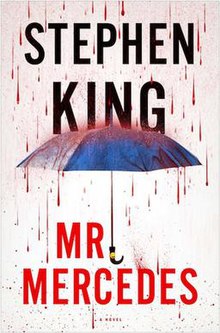
Ah I am beginning to understand why so many people love and will continue to love Stephen King novels. They are the epitome of a fun thriller without ever really feeling like a guilty pleasure. Characters tend to work, the writing is brisk, and their sheer popularity makes the read more relevant, especially if you are someone who likes to “get” popular culture references. That being said, Mr. Mercedes is not without its flaws, and when it really comes to the wire, there are quite a few things in the way of this approaching King’s previous masterpieces (It, The Tommyknockers, etc.). Not that I have read them, as the only other King work I have ever read is The Stand, which was…certainly a journey. Mr. Mercedes marks a departure for the king of 20th century horror, into the region of the so-called “hard-boiled detective story”.
Mr. Mercedes begins incredibly strong, with the use of a first chapter that shows what many have tried but failed – an introduction whose raw emotions and atmosphere could make it its own story. Take that very first chapter out, and it could definitely work. But the way King seamlessly transitions from this stellar beginning tragedy to its aftermath is quite masterful. He links emotion to emotion, emotion evoked from the audience to a character contemplating his own emotions. Bill Hodges is a retired police detective, and in his lackadaisical days of wallowing on with life, he considers suicide. Then mail arrives, addressed to him from what appears to be the perpetrator of one of the few unsolved crimes that marked Hodges’ otherwise unblemished record. The letter taunts and goads at Hodges, who in term is consumed by a rekindled rage to fight, and to catch him. Now up until this point, King has done everything in good taste; he has all the ingredients, and in the hands of someone like King, he can definitely make something out of it. Each layer he adds creates a more complete picture, woven extremely tightly. Nigh perfect if I dare say so myself, but then the cracks begin to appear.
As a character, Hodges is likable – he is charming, nice, and actual empathizes with other characters. He never feels forceful, and this is where the disbelief begins to appear. If Hodges is such a great personality, how he can keep it when he chases Mr. Mercedes, without involving the police? The answer? King begins to shift other characters, and bending the plausibility of the plot to adapt to Hodges’ stagnancy. Hodges has to be pushed, be fed incentive to hunt the killer, and this takes away credibility from the entire setup. Why even bother with trying to catch the killer by himself when he needs motivation with each obstacle? Here, it feels like the presence of other characters not only hinders his own development, but even slows down the plot.
Another problems lies in the middle of the novel, which experiences a lull. Or at least, I did. The beginning was gripping, a psychological study of both the cat and the mouse, but the middle, which should be King winding up the tension, feels too flat. I will say it here – one hundred pages of the middle of Mr. Mercedes could have cut out, and I wouldn’t really feel the difference. Now sure, the final buildup wouldn’t be as exciting, but I also wouldn’t have to force myself to turn the pages until we reach that ending. Actually, from what I understand, this is a problem with a lot of King books – they could definitely pass a few more cuts. But I guess when you are a superstar author where it doesn’t matter what you write about as long as you write, this is understandable.
Also, did anyone else feel Mr. Mercedes was a weird form of Norman Bates? Maybe it is just the Oedipus complex, and their intelligence but I kept on feeling the vibes and connections between the two.
Overall, another great novel from Stephen King book-ended by a fantastic beginning and a thrilling ending, but let down by the excessive, stagnant middle.

Doesn’t everyone like the ice cream man?
3.5 Stars









